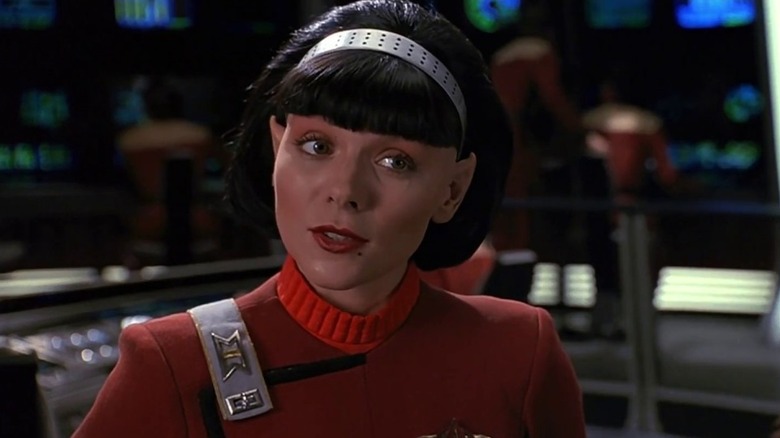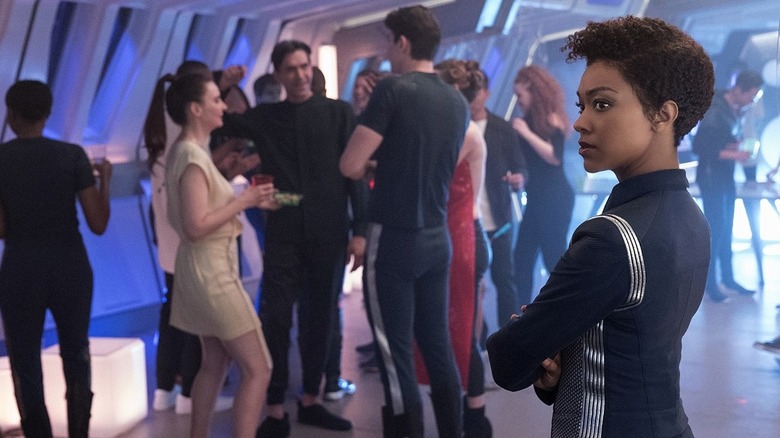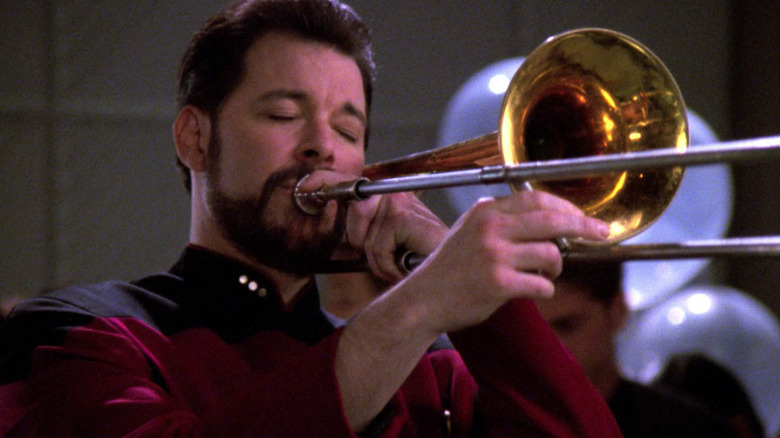Why It Feels So Weird When Star Trek Uses Pop Music
It was weird from the start.
Sometime in 2008, trailers for J.J. Abrams' upcoming film "Star Trek" began to appearing theaters. This new film, the previews announced this quite clearly, was going to be quite different from the "Star Trek" of yore. This was going to be "Star Trek" — to employ a dated slang term — on steroids. Audiences witnessed a young blonde kid in a red convertible Chevy Corvette blasting down a country road, a motorcycle cop on his tail. He charges toward a cliff with no sign of stopping. He dives out just before the car barrels into the chasm below. He is covered with dirt and defiance. When the cop asks him his name, he says he's James Tiberius Kirk.
It was weird enough seeing a car in the preview — vintage Chevys were still plentiful enough to go joyriding in by the 23nd century? — but it became weirder when, in the actual feature film, that scene was accompanied by the young Kirk (Jimmy Bennett) blasting the Beastie Boys' 1994 hit song "Sabotage" on the radio. "Sabotage" is great and it rocks, and its use provided something loud and rebellious to play while Kirk drives past Iowa farms, passing a hitchhiking pal (also a weird sight in a world with transporters). One might be tempted to assume this was a reference to a notable line of dialogue spoken by the Vulcan officer Valeris (Kim Cattrall) in "Star Trek VI: The Undiscovered Country," but it's far more likely that the filmmakers of the 2009 film merely wanted to include a pop song on the soundtrack.
Of "Star Trek."
A pop song. It's weird.
Let us explore why.
That which survives
"Star Trek," many might have noticed, has been incredibly ginger with its use of pop culture references. It's very rare that an Enterprise crewmate will make reference to any kind of song lyric or television show from the 20th century. Very occasionally, a visiting dignitary might whistle a few bars from "If I Only Had a Heart" from "The Wizard of Oz," but that's usually about as close to the present as the franchise will get. Even as Trek moves forward, it never alludes to anything that was hip when the original series aired in the late 1960s.
This makes perfect sense from a practical perspective and a hubris perspective. A wise screenwriter would not be so presumptuous as to posit that a contemporary piece of pop art will be important enough to persist into the utopian future of "Star Trek." One can already see memes online about the one time "Star Trek: Discovery" made a reference to the brilliance of Elon Musk. This, in addition to the crew of the U.S.S. Discovery jamming out to Wyclef Jean's "We Are Trying to Stay Alive" from 1997.
Contemporary references are a grand way to assure your screenplay will be quickly dated, so Trek largely eschews them. More commonly, when a "Star Trek" character makes reference to art and culture, it's typically high art from a comfortable distance in the past. Captain Picard (Patrick Stewart) is a big fan of Hector Berlioz and Shakespeare. He might go as modern as "Finnegans Wake," published in 1939. Commander Riker (Jonathan Frakes) prefers jazz, a form that finds its origins in the very late 19th century. No one on the Enterprise, however, listens to Beyoncé, Metallica, or Captain & Tennille.
The future is classy
This use of classical music and literature throughout "Star Trek" not only avoids playing undue credit on contemporary pop culture, but communicates a certain level of artistic sophistication to the world of the future. "Star Trek," show creator Gene Roddenberry seems to say, will be a more cultured place that the present. The idea of ultra-commercialized pop media will be gone in a post-capitalist society, and all that will be left will be more "adult" art.
One can argue, of course, that even ultra-commercialized pop art has its value, and perhaps there still is a Beyhive in the 24th century, but it's certainly something rarely depicted on a Federation starship. Instead, the eschewing of pop music in "Star Trek" goes to a deeper idea within the franchise, and one that reveals an unexpectedly abiding pessimism.
Roddenberry envisioned a bright future for humanity, wherein war would be eschewed, money disposed of, and cooperation paramount. The future of humankind, he argued, was bright. It would be bright because humanity openly rejected conflict, dominance, and greed, accepting diplomacy, education, and exploration in their stead. In order to get to the bright future, however, Roddenberry had to essentially drive humanity to the brink of annihilation. According to "Star Trek" lore, we are due for several devastating wars in our near future. The Eugenics wars will involve specially engineered humans, and World War III will wipe out most of our population.
It will only be after humanity is wiped out — a species on its knees — that it will achieve the necessarily cultural clarity to create a utopia.
An optimistic future, a pessimistic present
This central conceit of Trek — that humanity needs to have a good strong Etch-A-Sketch shake before it can draw a new picture — does serve a basic narrative function, of course. Humans wouldn't have a lot of access to 20th-century pop culture if it has all been wiped out in the wars. But it also reveals that Roddenberry didn't feel too rosy about the world of the 1960s.
Roddenberry's utopia, it seems, was a fantasy born of turbulence. He looked around at the social strife, racism, warmongering, and petty corporate greed, and deigned to imagine a world without any of it. Roddenberry was hopeful about the future, but incredibly cynical about the present. So cynical, in fact, that he fictionally bombed the 20th century into the stone age. Total destruction was, he seemed to feel, a hard lesson we all needed to learn. Humanity would need to become a post-apocalyptic species of kangaroo courts and petty revenge before we could come to appreciate the message of interplanetary community given to us by the Vulcans on First Contact Day.
As such, any vestiges of Roddenberry's present would have to be destroyed along with the aforementioned greed and iniquity. This meant that pop culture would have to go with it. Sorry reruns of "Batman" or "The Monkees," or anything that came after it. You are but a vestigial outcropping of a failed humanity.
So it does sound quite odd when pop songs from the 1990s work their way into "Star Trek" vernacular. The songs are driving and energetic, yes, but every Trekkie seems to inherently sense that those things shouldn't exist.



